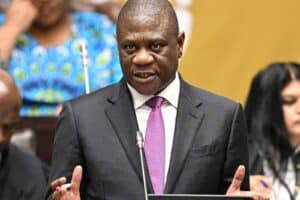Busa pledged the willingness of business to participate in a new government-initiated social compact to grow the economy.

Big business has told the government to start acting more and talk less – and they are ready to collaborate with it to grow the country’s economy.
But they wanted to see more implementation of decisions, which is what South Africans want.
This was a clear message from Business Unity South Africa (Busa) chief executive Cas Coovadia as he pledged the willingness of business to participate in a new government-initiated social compact to grow the economy.
He said the state must lead the way to lure investors and they would partner with it to ensure decisions were implement quicker.
ALSO READ: List SOEs on JSE to help economic growth – business experts
Coovadia was addressing a webinar panel discussion, jointly organised by National Economic Development and Labour Council (Nedlac) and Mapungubwe Institute for Strategic Reflaction, focusing on lessons learned by various social partners from Covid and how those could be utilised in the future crises.
“Busa has taken the view that government needs to take some leadership in the whole process about attracting investment and bring about growth.
“What we mean about that is that the government should, as a parallel to the social compact, also have bilaterals where government and business meet, which will result in quick implementation,” Coovadia said.
Busa said bilaterals would help identify critical areas the partners should begin to implement.
“I think that’s a test. I think the public also wants to see that we begin to implement stuff,” he said.
The reason various social partners cooperated so well during the pandemic was because they had a particular focus to manage it and to get as many people as possible vaccinated.
“All social partners knew that if we don’t get our act together, if we don’t manage the pandemic effectively and get as many vaccinated, people are going to die. There was a clear focus,” Coovadia said.
READ MORE: Small business master plan, but no space for franchises
Cosatu’s parliamentary coordinator, Matthew Parks, said the social partnership formed layed a positive foundation for future social compacts and building South Africa.
The process helped to reveal unsung heroes of Covid and stamped the role of Nedlac in championing social partnership in the interest of the country.
But one of the lesson was a need to ensure adequate insurance and all persons and businesses aware of Sasria insurance and how to apply for damage claims, especially in the townships and rural areas.
Solidarity Fund’s head of humanitarian relief, Wendy Tlou, said the fund played a critical role in delivering on the shared goal to save lives during the pandemic.
The fund is unique in the world as a multi-sectoral rapid response vehicle that supports the government and works loosely with business.
Nedlac’s executive director, Lisa Seftel, said with lessons learned from the pandemic, via collaboration, the challenge was to replicate it, including the project management approaches and the adapt-adjust lessons.
NOW READ: To grow, SA has to embrace a new way to do business






